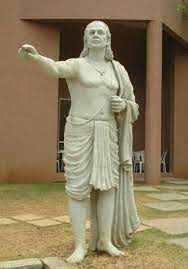Aryabhatta was a legendary Indian mathematician and astronomer who lived in the late 5th and early 6th centuries CE. He was born in Kusumapura (modern-day Patna in Bihar, India) and was one of the most influential mathematicians of his time. He is credited with the invention of the decimal system, the concept of zero, and the value of pi, and his contributions have been instrumental in the development of modern mathematics.

Aryabhatta’s contributions to astronomy were equally remarkable. He formulated a theory that the Earth rotates on its axis and that the moon revolves around the Earth. He also accurately calculated the duration of a solar year to be 365.358 days, which is remarkably close to the current value of 365.2422 days.
One of Aryabhatta’s most important works was the Aryabhatiya, a treatise on mathematics and astronomy that contained his theories on planetary motion, eclipses, and the phases of the moon. The text was written in verse form and was widely studied in India and beyond. It is believed to have had a significant influence on the development of Islamic astronomy and was even translated into Arabic in the 8th century CE.
Aryabhatta’s legacy continues to this day. In 1975, India launched its first satellite, Aryabhata, in honor of the great mathematician and astronomer. The satellite was designed to study X-rays, gamma rays, and cosmic rays, and it played a critical role in advancing India’s space program. Today, his name is synonymous with scientific inquiry and discovery, and he is remembered as one of the greatest minds in Indian history.
In conclusion, Aryabhatta was a remarkable figure in the history of mathematics and astronomy. His contributions have been instrumental in the development of modern mathematics and have had a lasting impact on our understanding of the universe. His work stands as a testament to the power of human curiosity and the enduring value of scientific inquiry.
Important Links